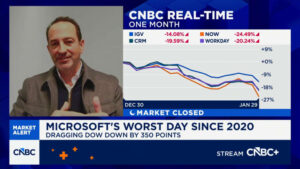Sitting in the FTSE 250, ITV (LSE:ITV) can sometimes be forgotten by investors trying to build income portfolios. Further, the 45% fall in the share price over the past two years (broadly flat over the past year) might also scare some away. Yet when looking at the core business and the dividend forecasts, I think it could be a smart buy.
Taking stock of the numbers
At the moment, the dividend yield is 7.1%. The dividend per share of 5p that this takes into account is made up of the interim dividend of 1.7p from last year and the final dividend following the full-year results of 3.3p in March.
Typically, two dividends are paid each year in this usual timeframe. The second one for 2023 is forecasted to be 1.7p, so the total for 2023 is likely to be unchanged at 5p total.
However, the 2024 forecasts are for 2p and 4.5p (6.5p total), with 2025 estimates being 2.5p and 4.5p (7p total). Granted, trying to predict the dividend payments for 2025 isn’t an exact science! But the general theme is clear to me that investors are expecting the dividends to increase.
Caution when making predictions
When trying to extrapolate the dividend figures into a dividend yield, I have to be careful. This is because the yield involves the share price, which changes every day. So I can’t say for sure what the yield will be next year or beyond.
Not only that, but dividends aren’t guaranteed payments in the same way a bond coupon is. This means that ITV could decide to cut the dividend based on future financial performance.
If I assume the share price stays the same, I can get a rough guide. So for 2024, the forecasted yield would be 9.16%. For 2025, this could rise to 9.87%. As we currently stand, that would make it one of the highest yielding stocks in the entire FTSE 250.
Why ITV could deliver
Aside from the pure numbers, could ITV fundamentally deliver on such forecasts? A good measure of this is the dividend cover. This looks at how many times the dividend per share can be covered by the latest earnings. For ITV, it stands at 2.64. Any number larger than one is a positive, so this figure is more than comfortable.
ITV earnings are robust. Even though traditional advertising revenue fell 1% year on year, growth in in-house production (ITV Studios) was impressive. This growth was noted both in the UK market and in the US.
On the basis that this division, along with streaming, can continue to grow and support the decline in ad revenue, I don’t see any major problem for future earnings. As a mature company, a key way that the business can keep shareholders engaged is via dividend payments.
This post was originally published on Motley Fool







